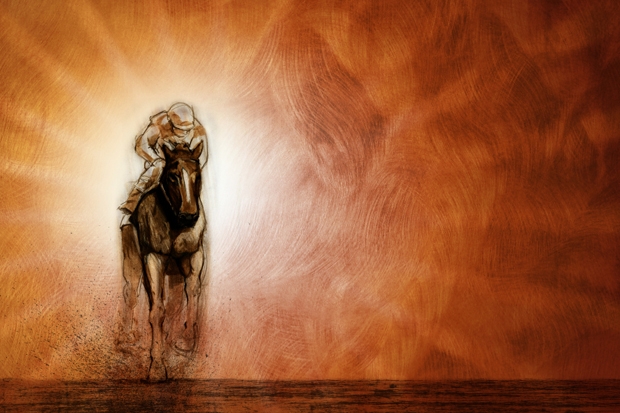There were moments while reading this sprawling, ambitious novel when I thought I was reading a masterpiece. But at other times, it felt as if the author was convinced that she was writing one.
The Sport of Kings is the story of the Forge family of Kentucky. They’re a brutal lot. In the opening scene, John Henry Forge ties his son Henry to a post and whips him. A black employee, Filip, caught with John Henry’s wife, is lynched. As well as violence, John Henry instils a fierce sense of destiny in his son. Against his father’s wishes, Henry turns the family farm over to raising racehorses.
Through some severe inbreeding, Henry creates the horse from hell, the aptly named Hellsmouth, an immensely strong but fragile filly. Henry’s only child Henrietta hires a former convict, Allmon Shaughnessy, as a stable hand. In some of the most powerful scenes in the book, Morgan describes Allmon’s childhood growing up in Cincinnati as the son of an absent white father and a black mother. He has ‘a biography that consisted of a single word. Want.’
There’s a tragic inevitability about Henrietta’s burgeoning relationship with Allmon. Despite her wealth, Henrietta is as trapped as he is. ‘She knew with absolute certainty that there was no animal on earth less free than herself.’ In The Sport of Kings, characters’ fates are shaped by their ancestors’ actions rather than by their own will.
It’s the opposite of the American dream; in fact it has more in common with Greek myth. As Morgan puts it: ‘You would never escape the category of your birth.’ Slavery is not a historical event but part of everyone’s day-to-day reality.
Horse-breeding functions as a metaphor for how things are passed down the generations. ‘Hate has always coursed through your line like a mutant gene,’ the narrator says about the Forge family. It’s a vivid analogy, but Morgan doesn’t half lay it on thick with lengthy digressions into genetics, evolution and family history. The book is at times astoundingly overwritten. After one particularly flowery passage, Morgan writes: ‘Or is all this too purple, too florid? Do you prefer your tales lean, muscular, and dry?’ ‘Yes,’ I was screaming, ‘I do!’
That’s not to deny the novel’s power. Morgan has a gift for character; the minor figures in particular are superbly drawn. And at times my compulsion to read on was like a physical force. For all its flaws, The Sport of Kings catches the spirit of modern America: violent, divided and profoundly pessimistic.






Comments